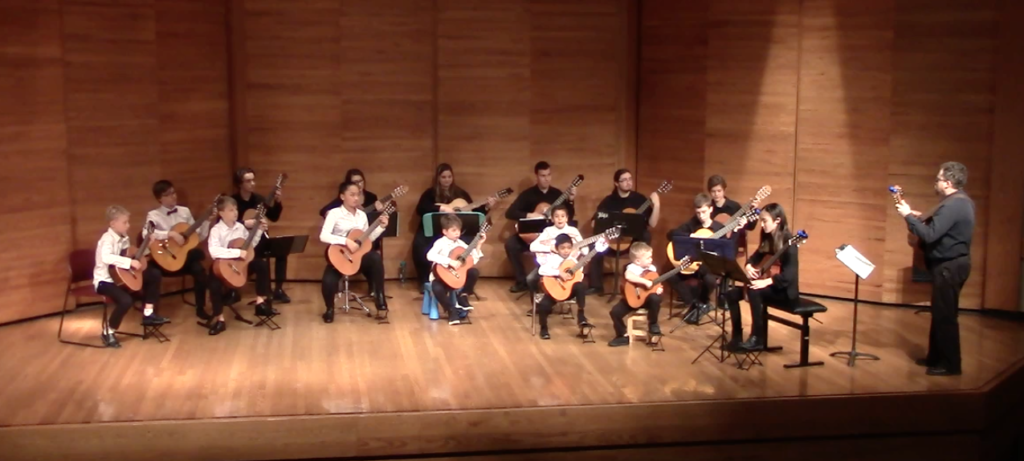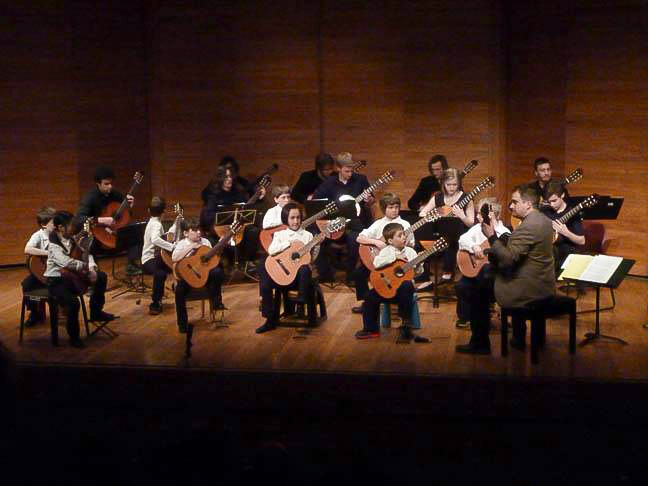Paul’s Vision/Mission Statement:
“To nurture a sustainable classical guitar program that will enable children to achieve their full potential as musicians and as people, while serving as a model for high-quality guitar-teaching and a catalyst for cultural development in the Western Manitoba corner of the global community“
Through the medium of classical guitar, Paul strives to use his advanced training as a musician and a teacher to develop the musical abilities of the young families of today, in order to help mould the character of the adults of tomorrow.

The Suzuki Method for Classical Guitar is a discipline that is rapidly gaining momentum in North America, Europe, and Australia. The video found here was produced by the Suzuki Association of the Americas in the spring of 2009, and is an excellent summation of the current state of affairs of the Suzuki Guitar movement. There are a handful of Suzuki guitar teachers in Canada; Paul counts himself among this number, and is proud of his work at the Eckhardt-Gramatté Conservatory in Brandon.
Paul has taken short-term teacher-training courses with Suzuki guitar pedagogues Frank Longay, William Kossler, David Madsen, Andrea Cannon, and Joe Pecoraro. In so doing, he has learned the importance of making music education a satisfying and nurturing experience, while creating the conditions to allow each child to fulfill his or her maximum musical and personal potential. In short, Suzuki training has made him a better teacher. For more information on the Suzuki Method for Classical Guitar, please visit the following websites:
The Longay Conservatory of Guitar
The Suzuki Association of the Americas
Twinkle Together Guitar Studio (Steve Bondy, Director)
Mary Lou Roberts, SAA Guitar Teacher Trainer
Paul’s Thoughts on Teaching
In order to understand how I work as a teacher, I think that it would help to consider the following two points:
- Music is a language
- Every Child has the Ability to Learn
I consider the first point to be self-evident: To me, a language is a collection of sounds whose rhythmic and tonal patterns are systematically organized so as to convey some manner of meaning to a listener. The rules that govern how these rhythmic and tonal ideas are organized are extensive, be they the grammatical guidelines of any spoken language or the harmonic conventions taught in Western music – I have never compared a freshman music theory assignment with a piece of Grade 5 grammar homework to see which had more red ink from a teacher’s pen, but I would imagine that they would be close. When I consider the complexities of its aural and written forms, I simply cannot envision music being anything other than a language.
That said, let’s go to item #2. The greatest gift that a child has is the skill of knowledge acquisition. It’s the gift that has enabled our species to survive, thrive, and evolve in a world full of creatures bigger, meaner, and hungrier than us. The brains of very small children are hard-wired to learn – they learn about their environment, they learn survival instincts (reacting to hunger, fear, etc.), they learn the sound of their mother’s voice. As the child gets older, s/he learns how to walk, run, throw a baseball, hold a pencil, etc. It’s a gift that has given the human race the ability to adapt to its environment – thanks to their unprecedented brain power and its associated penchant for knowledge acquisition, our ancestors were able to both visualize the wheel and make it a reality, make clothing and other articles out of animal fur (the original owners thereof having been dispatched with tools and weapons forged by human hands), cook meat, plant crops, build cities, and so on. The advanced ability of knowledge acquisition has made us unique among the Earth’s creatures – it helps define us as human.
Our humanity is further defined by our ability of language use, the development of which is a huge part of the mental development of a young child. It was a young Japanese child’s capacity to learn the intricacies of his mother tongue that led Shinichi Suzuki to develop the method and teaching philosophy that is named for him. His revelation that all Japanese children learn to speak Japanese seems at first to be little more than the statement of a self-evident fact – hardly the basis for a music education philosophy, one would think.
Dr. Suzuki, however, had a gift for seeing wondrous things in everyday events. His discovery goes to the core of how a child acquires language: a child who is raised in a particular linguistic environment learns how to communicate in that environment. As recent language-immersion initiatives in Canada and elsewhere have proven, a child who is raised in a linguistic environment consisting of two or more languages (English at home, and French at school, for instance) learns to communicate in both of them and differentiate between the two – the child knows which language to use with which person.
It is evident, therefore, that children have the capacity to learn how to communicate. According to proponents of the Suzuki Philosophy, this is indicative of tremendous talent and potential – it’s remarkable that a child can have such a capacity for language acquisition, whereas adults who try to learn a second language will attest to the difficulty of the task.

By declaring that every child is talented, however, is not to say that children are equally talented, neither in language acquisition nor in anything else – ten children will learn language at ten different rates and in ten different ways; some will have a more supportive environment than others; some will be quicker on the pickup than others (through nurturing and education, however, children acquire a learning curve – another important aspect of ability development is developing the ability of knowledge acquisition). Indeed, some children, due to disability or misadventure, may have a greatly-diminished capacity for language acquisition. That said, it is important to recognize that the capacity is still there – the teacher has to find a way of accessing it for each child. Each child, in some way or another, will eventually learn the intricacies of communicating – very few of them will grow up to be professional speakers, but that doesn’t matter: most will learn to speak their mother tongue at a very high level.
Each child, furthermore, is his/her own benchmark; comparing the progress of a child against some external standard of which the child has no understanding (or even comparing the child with another child) is hardly fair. A child will learn at his/her own pace – as people, children deserve our respect for that.